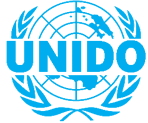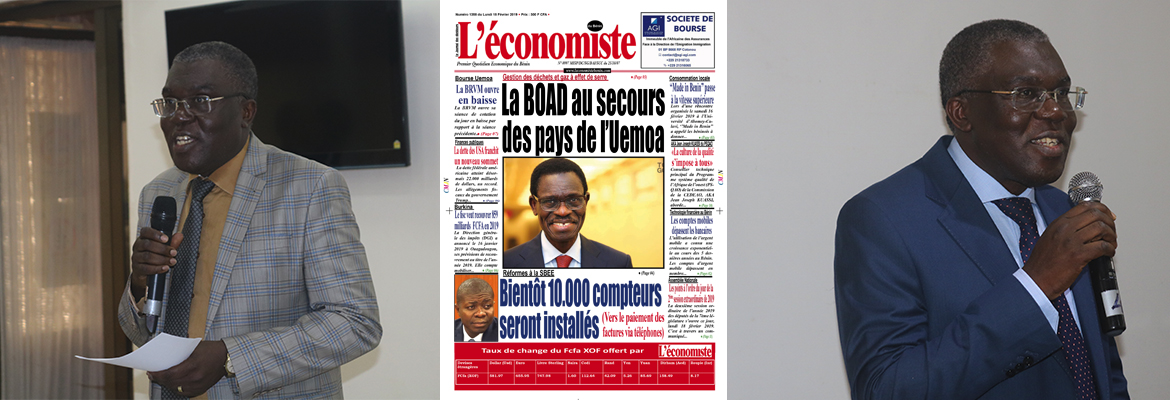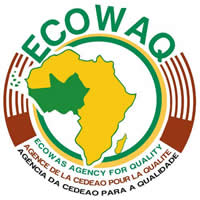





‘’The culture of quality is essential for all’’
Principal Technical Advisor of the West Africa Quality System Programme (WAQSP) of the ECOWAS Commission, Mr. AKA Jean Joseph KUASSI, addresses in this interview the conclusions of the training workshop for media professionals in the region on the quality, held in Abidjan on 27 and 28 November 2018.
L’économiste du Bénin: You have gathered here in Abidjan media professionals from all ECOWAS States and Mauritania to strengthen their capacities on the concepts of certification, accreditation, all that concerns quality. After two days of training, what are your first impressions?
AKA Jean Joseph KUASSI: My impression in general view is that the ECOWAS Commission was really right to invite journalists to this seminar because, in the field of quality, we are dealing with a topic that touches populations; a subject that is approached a little too technical. When we talk about quality in general, people do not know what it is, when we talk about standardization, accreditation, certification, inspection, etc., for the population for whom these tools are developed, it seems boring. We who work in the fields, we have a language too technical, so what we cannot be well perceived by the populations. We then developed a number of tools in the region with ECOWAS and the UEMOA Commission and these tools began to be operational. These tools have been proposed to defend the quality of life of the populations. It was important that we begin by seeing how to communicate to people what we are doing. And we know that journalists play an important role in the communication aspect, the aspect of transforming information that is too technical, so that it is better perceived by the people. We were right because the journalists who followed this training showed their interest in the topics addressed and then by the quality of the questions that were asked, we feel that there is still an interest in conveying the message to the people.
L’économiste du Bénin: What was the content of this workshop?
AKA Jean Joseph KUASSI: The journalists we invited are consumers. They asked questions in my opinion that consumers should even ask themselves. We tried to discuss together and we even had suggestions and proposals that we will take into account to improve our communication to the people. We had a general presentation of what is meant by quality with its different components. And to touch everything we have said, we visited an important laboratory that has the support of the ECOWAS Commission in the framework of quality development, analyzes and so on. And there, I think that we brought the journalists to make a comparison of the very technical languages that we use. By making a comparison with the populations who come to see the laboratories to be able to make analyzes. I was personally touched during this visit. Because, I saw that there is a beginning of consciousness on the questions which affect the quality; a beginning of consciousness about the quality culture that began to develop. There is a department store that is a customer of the laboratory in question and has testified. This store, it is concerned about the quality of the products it offers on its shelves. Before offering its products, it goes to the laboratory to see if these products are suitable for consumption. That's an example of what we want. That there are service and products providers, who want to know what is the level of quality of what they offer in the market. This store went to a laboratory that is accredited, that is to say whose skills are internationally recognized. So this part of the visit was for me one of the most important moments. Then we tried to make our guests understand that all the processes that we are putting in place need reliability. When you have a laboratory, analyzes, certificates of analysis that are issued by these laboratories must be recognized. This recognition is based on the effective competence of those who work in the laboratories but also on the quality of the equipment that exists in these laboratories. You can use equipment that does not conform, that does not give the true values.
L’économiste du Bénin: In this dynamic, what role should the States play?
AKA Jean Joseph KUASSI: States must be made to understand that quality is an essential element of economic development. Quality protects people, secures imports, and builds confidence in products that are exported. So ECOWAS has led States through Heads of State and Government to adopt what is called the ECOWAS Quality Policy which unites all the orientations that must be taken at the level of the region by all the countries. Then ECOWAS helped each State to adopt its own national quality policy which must be in harmony with the regional. From this fact, we can say today that all countries have texts that are harmonized. This is important when you are in the same economic space where you want products to circulate freely. You know that questions of standard and quality can also be obstacles. Then ECOWAS set up structures at the regional level.
L’économiste du Bénin: Why set up structures at the regional level?
AKA Jean Joseph KUASSI: This is because the search for quality has a cost. ECOWAS has put in place structures to rationalize resources. That is, for example, in the area of accreditation, instead of each country having its own accreditation structure, in the UEMOA region, countries have one accreditation body, which would have been more costly to create one accreditation institution for each country; ECOWAS has helped to create regional accreditation structures to get countries to agree on how to manage quality in the different technical fields in standardization, metrology, laboratory evaluation, etc. So the basic prescriptions are there and ECOWAS is pushing the States to develop their own structure which is put in relation with the regional one. So this is what is being done at ECOWAS level and has helped to establish a quality ECOWAS award whose first edition took place in 2017 and which will continue. There is also an ECOWAS quality Mark.
L’économiste du Bénin : What about innovations to improve everything that is being done in the West African sub-region?
AKA Jean Joseph KUASSI: These innovations will be discussed because we will take stock of what happened and the awards Committee will look into this. This is true, during the first edition of the ECOWAS Quality Award, there has been good, and there has been less good. The committee will come together to see what has been good, what has not been good. It is a continuous process of improvement. Observations will be made which will be taken into account. Even in terms of the criteria for awarding the prize, we revisit these criteria a bit, taking into account what we have seen on the ground. Already, we have started work with the Commissioner for Industry and Private Sector Promotion. Generally, the Commissioner takes advantage of his missions in the countries to visit a certain number of structures. Notably, he had to visit or did visit some structures that are accredited and our goal was to see how the structures are accredited; has it allowed them to have more customers, to have more notoriety and how they manage to survive, to face the cost of accreditation.
L’économiste du Bénin: Is there a problem of profitability of the accreditation?
AKA Jean Joseph KUASSI: It is true that when the structures are accredited, they have certain notoriety on the outside; which gives a craze to the staff working in these accredited structures. However, we were made to understand the high cost of accreditation. So there is a return on investment that is not necessarily effective whatever it gives certain notoriety. So we have taken note of a number of observations and we are working to make suggestions for reducing accreditation services or acquiring accreditation itself. Accreditation structures cannot be self-financing. It's a kind of public service. It is an obligation for States to make sure that everything that is done by accreditation, compliance, I mean certification services, laboratory, are reliable. The State has the duty to look after that. If the structures that work there do not have enough resources, it is clear that the state must intervene in one way or another to be able to fill through subsidies. These structures can also develop own resources. It is done, but generally when we look around the world, the revenues of the accreditation structures do not cover all costs, that's why we need State subsidy.
L’économiste du Bénin: What can you say about the aspect of education, quality culture in West Africa?
AKA Jean Joseph KUASSI: I will say that it is another pillar of quality. That is to say, quality ultimately is a question of culture. When you go to Europe, to countries like Switzerland, when you throw a cigarette butt, for example, there is someone who will tell you to pick up this butt. When the African goes to Switzerland, he is careful when he walks. But when he gets home, his cigarette butt, he throws it, when he takes a banana, he throws the skin in the street and no one will ask him that and then in his culture, we can throw in the street. That's why education is needed and, on a continuous basis, you have to educate, you have to raise awareness at the highest level. Even decision-makers need to be made aware of quality issues. Consumers too, need to be educated about quality issues. And with regard to consumers, we want to work with you as journalists to help us get the message across. But there are other ways to educate people. Quality should normally be taught in schools and universities, in our opinion. Currently, we are addressing this issue at the level of the ECOWAS Commission where we will start with Higher Education. We are currently doing a study to see how to teach quality at the level of High School. More and more, schools are starting to specialize in the area of quality, but it's a bit scattered. We want to start there and then go down to primary school.
L’économiste du Bénin: A word to conclude this interview
AKA Jean Joseph KUASSI: It is essential that people see the importance of quality. We tried to show you some aspects, but we are not sure that we have totally arrived. It's a beginning, maybe we'll continue with you but we need to educate everyone. When you go to a restaurant, you eat. But do you ever go for a walk in the backyard where they prepare the dishes? There are quality issues, hygiene issues that arise. So, it's a question of education. When people are better educated, they will be more considerate of quality and when the population will be as demanding in terms of quality, those who provide the services will be obliged to go to quality; so the best investment in this area is education. We need to invest in education, training, awareness because it will create needs that service providers will have to meet standards. Companies, as long as there is a market, they will invest for that. If the market demands quality, companies will even buy the labs. But if no one asks for quality, they will not do anything. Because they know that if people ask for quality and they do not offer quality products, they will end up doing it to satisfy the demand. So this is a big project where we need everyone, consumer associations, journalists to help us get the message and the workshop we had, it's a first, the ideal would be a group of journalists specialized in quality issues who can work at the level of different committees to guide us in the way to make the quality known.
Interview conducted by Joël YANCLO, reporter at Economiste-Benin
Translation: Serge David ZOUEME, Communication Expert WAQSP-UNIDO
 This program is funded by the European Union with the technical support of UNIDO, the implementing Agency
This program is funded by the European Union with the technical support of UNIDO, the implementing Agency
The views expressed in this publication do not necessarily reflect those of the Commision of the European Union




Copyright - 2019 - ECOWAS AGENCY FOR QUALITY